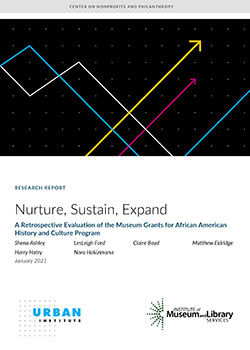News Releases | January 29, 2021
Share ThisIMLS Releases Retrospective on 15 Years of African American History and Culture Grants
New Study by Urban Institute Identifies Opportunities to Strengthen African American Museums, HBCUs

Washington, DC—The Institute of Museum and Library Services today announced the release of a comprehensive evaluation of the Museum Grants for African American History and Culture (AAHC) program over the past fifteen years. The IMLS grant program began in 2006, and over the past fifteen years, has invested around $22.5 million in 110 organizations across 31 states. AAHC grants support activities that build the institutional capacity and promote the growth and development of museum professionals at African American museums.
The full report and a one-page summary fact sheet are available on the IMLS website.
"IMLS has been supporting African American museums and Historically Black Colleges and Universities for many years, with the goal of forwarding the tremendous work they do in telling our nation’s history,” said IMLS Director Crosby Kemper. “These institutions, many of them small, are in need of funding and resources like never before. This evaluation will help IMLS strategize ways to improve engagement, address barriers and challenges to grant applications, and forge new partnerships with other stakeholders and funders.”
The Urban Institute conducted the study using a mixed-method strategy to obtain a comprehensive understanding of the program, the universe of eligible organizations, and the profile and institutional growth of AAHC grantees. The investigators augmented analysis of administrative data with interviews and surveys of stakeholders. The resulting report provides an overall assessment of how well the grant program has performed relative to the goals articulated in its enabling legislation.
“We are very pleased with this comprehensive third-party evaluation—the first of its kind since the inception of the AAHC grant program,” said Paula Gangopadhyay, Deputy Director of the Office of Museum Services. “This study provides IMLS with a well-informed roadmap for our future efforts to strengthen the capacities of African American museums and HBCUs, especially as we are seeing a record increase in the application pool."
Highlights from the Study
Interviews with awarded applicants revealed the overwhelmingly positive impact of AAHC grants. Most cite the program as having enabled their museum to significantly expand its outreach, build capacity, strengthen professional training and development, improve financial resilience and sustainability, preserve and increase access to collections, and more effectively connect with audiences.
Other findings from the evaluation include:
- Since its inception, the AAHC program has received applications from more than half, or 55 percent, of the overall pool of eligible organizations.
- Between 2006 and 2020, IMLS awarded 215 AAHC grants totaling $22,582,233 to 110 organizations.
- Awards have been granted across 31 states.
- Nearly half of awarded applicants have received an award more than once.
- Applications from HBCUs have increased and have had higher success rates than non-HBCUs.
For more information about the AAHC program, please visit the IMLS website.
About the Institute of Museum and Library Services
The Institute of Museum and Library Services is the primary source of federal support for the nation's libraries and museums. We advance, support, and empower America’s museums, libraries, and related organizations through grantmaking, research, and policy development. Our vision is a nation where museums and libraries work together to transform the lives of individuals and communities. To learn more, visit www.imls.gov and follow us on Facebook and Twitter.
About the Urban Institute
The nonprofit Urban Institute is a leading research organization dedicated to developing evidence-based insights that improve people’s lives and strengthen communities. For 50 years, Urban has been the trusted source for rigorous analysis of complex social and economic issues; strategic advice to policymakers, philanthropists, and practitioners; and new, promising ideas that expand opportunities for all. Our work inspires effective decisions that advance fairness and enhance the well-being of people and places.

